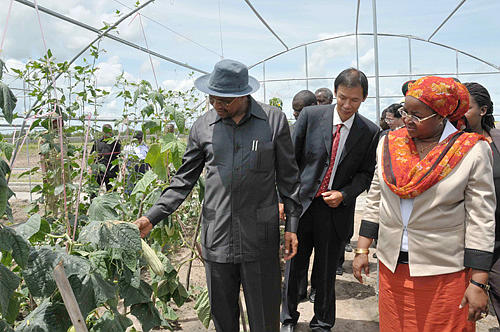|
 |
|
AGRICULTURAL BOOST: Tanzanian President Jakaya Kikwete (left) visits a farm at a Chinese Government-sponsored agricultural technology demonstration center in Tanzania's Morogoro Region on April 2 (GUO CHUNJU) |
Obviously, the high feasibility of the early harvest plan does not necessarily mean an agreement could finally be reached, passed by the parliaments of the countries concerned, and ultimately put into practice.
Moreover, the early harvest plan is only a small part of the Doha Round talks. An agreement on this plan could increase confidence for future negotiations, but is unlikely to break the stalemate. The plan is therefore more of a delaying tactic than a solution. While shelving disagreements, it has not narrowed the differences that have led the Doha Round to its current deadlock.
Fierce contention
Development is the theme of the Doha Round trade talks. As developing members held that the commitments made during the previous Uruguay Round talks went beyond their capacity and that substantial trade liberalization had not brought the expected benefits promised by developed countries, the Doha Round sought to make up for these deficiencies.
But the United States and other Western countries have denied the theme with the excuse that the world economic landscape has changed dramatically since the Doha Round was launched 10 years ago. Instead, they have proposed to create an environment for "fair competition."
Western countries requested developing countries further open their markets and substantially cut tariffs on industrial goods and services. But meanwhile, they would not cut the export subsidies of their own agricultural products. Also, they imposed barriers on non-agricultural market access, which covers exportable goods of interest to developing countries, such as manufactured goods, fuels, mining products, fish products, and forestry products. Western countries' double standards are the major reason for the deadlock of the Doha Round talks.
Once negotiations on these contentious topics resume, developed countries and developing countries will fight fiercely on whether to stick to the theme of development or abandon it and whether to continue with the Doha Round talks or start a new system.
The Doha Round needs a new approach after a decade of unsuccessful attempts to bridge gaps among its members, said U.S. Trade Representative Ron Kirk in May. WTO Director General Pascal Lamy has also expressed disappointment at the slow progress of the talks.
Against this backdrop, bilateral and multilateral free trade agreements have flourished. For instance, 43 free trade agreements had been signed or implemented in the Asia-Pacific region by the end of 2010.
More free trade agreements are being deliberated or negotiated. A noteworthy one is the U.S.-led Trans-Pacific Partnership Agreement, which aims to create a free trade area covering the whole Asia-Pacific region.
The various free trade agreements will give rise to trade blocs that are exclusive and discriminatory. They may also split the global market and undermine the WTO's multilateral trade system. This further proves it is essential to complete the Doha Round negotiations as soon as possible.
The author is vice chairman of the China National Committee for Pacific Economic Cooperation
The Doha Round
The Doha Round is the latest round of trade negotiations among WTO members. Its aim is to achieve major reform of the international trading system through the introduction of lower trade barriers and other trade measures. Its work program covers about 20 areas of trade. The round is also known as the Doha Development Agenda as a fundamental objective is to improve the trading prospects of developing countries.
The round was officially launched at the WTO's Fourth Ministerial Conference in Doha, Qatar, in November 2001. The Doha Ministerial Declaration provided the mandate for the negotiations, which covered topics such as agriculture, services and intellectual property.
(Source: www.wto.org) | 